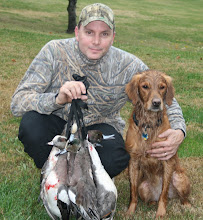 36 million homes. The show combines a taped hunt through the harvest and then focuses the majority of the time on preparing the dishes.
36 million homes. The show combines a taped hunt through the harvest and then focuses the majority of the time on preparing the dishes.Scott is as free with his recipes as he is with his one-liners. There are over 400 of Scott’s favorite recipes on HuntFishCook.com along with another 270 in his 2007 re-release of The Sporting Chef Cookbook. I asked Scott if he was worried about going broke by trying to sell cookbooks then turning around and offering them online for free? “You can’t make a living selling cookbooks,” he replied.
In addition to TV and the cookbook, Scott also performs live
 demonstrations and private events where he enjoys interacting with his fans. When asked if he has any good groupie stories, Leysath laughs, “Only if you count 90-year old ladies chasing me around the kitchen.”
demonstrations and private events where he enjoys interacting with his fans. When asked if he has any good groupie stories, Leysath laughs, “Only if you count 90-year old ladies chasing me around the kitchen.”One of Scott’s obvious missions in life is to help spread the gospel of properly prepared wild game. “I get asked all the time, ‘How do I get that livery taste out of my ducks (or geese, venison, elk, etc)?’ If I only had a dollar for every time I’ve been asked that question,” he says.
Scott says that, for the most part, game doesn’t taste livery. “Oh sure, there are a few notable exceptions, but if your duck tastes like liver, don’t blame the duck.”
There are a few things that will drastically increase the odds that your harvested game will taste its best at the table, particularly fowl.
“First, place your birds, whole or in parts, into brine consisting of 1 gallon water and 1 cup kosher salt. Put a cup of the water into a saucepan, add the salt and heat until dissolved. Add the rest of the water, submerge the ducks and refrigerate for 6 – 12 hours.” Scott says that brining replaces duck blood with a mild salt solution. Pat the brined ducks with paper towels, rub with some olive oil, salt and pepper and slap them on the grill,” says Leysath.
“The second trick”, says Scott, “is to cook your ducks in parts.” To make a point, Scott points to the leftovers at any duck dinner. If the ducks have been cooked either split or whole until the breasts are medium-rare, the legs are not, in his opinion, fit to eat.
“Medium-rare duck legs are tough and chewy. However, ducks breasts cooked to the same temperature - between 125 and 135 degrees - are tender, moist and not the least bit gamy.” The secret to making the best of both parts? During the season, cut off the legs and thighs and freeze them separately. When you get enough legs saved up, brown them in a skillet and then slow cook them in braising liquid like red wine, herbs, garlic and onions. After a few hours the legs are tender enough so that the meat can be easily eaten "with only a pile of clean bones left behind," testifies Scott.

On the other hand, “I prefer to cook breasts quickly – well-browned on the outside and rare to medium-rare in the center,” says Scott. Two different preparation methods for two different parts of the animal.
“Finally, and most important of all, don’t overcook your game, especially ducks,” says Leysath. “Overcooking makes game tough and muttony. Prove it to yourself. Cut a duck breast or other game in half and cook one piece until medium-rare. Cook the other half all the way through until it’s gray in the center. Now give them both a taste test. Amazing isn’t it?”
Tune in for Part III of the Leysath interview for a wonderful Pan Seared Duck recipe with Bourbon Butter Sauce, prepared especially for Hunt, Eat, Live!


6 comments:
Great interview, HuntEatLive. The food aspect of hunting is so important - hunters need to know how to get the best flavors out of their game, and the general public needs to understand that we really do eat what we kill. It's hard to combat the HSUS propaganda that tells non-hunters otherwise, but shows like this - and blogs like yours - are part of the answer.
-Holly
Yum, sounds like some good food. I've never seen the show, but I will look for it.
Thanks for turning me onto this site--good stuff! As Norcal says, too often the cooking part gets left out. What's the point of killing something if you can do it the honor of a good preparation to feed higher up the chain?
Good stuff here - the preparing of game meat is just as important as the hunting of that meat!
I will have to take a look at the site. My hunter is always looking for new recipes.
Nice interview. Scott and I approach things a little differently, but I wholeheartedly agree with his advice to separate your birds -- all birds, even domestic chicken and turkeys.
Do this and you will never toss your duck legs again, which is a good thing because doing so is considered "wanton waste" under the law...
Post a Comment